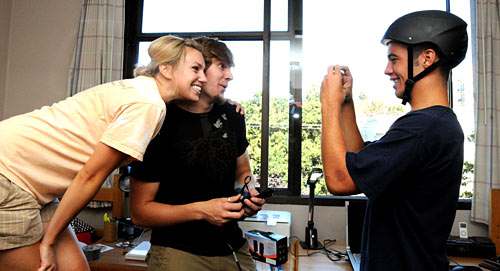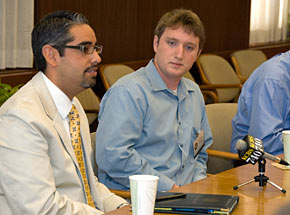UC Berkeley Press Release
 Sebastian Santana photographs a new Bear — his cousin, Berkeley freshman Michael Hastings of Anoka, Minn., on Move-In Day Sunday at Unit 3. Also getting in the act is Hastings' sister Amy, who attends the University of Minnesota. (Peg Skorpinski photo) |
Heading back to campus
BERKELEY – Fall classes begin this Wednesday (Aug. 27) for more than 35,000 students at the University of California, Berkeley. Semester highlights include a new program for students who are Iraq and Afghanistan war veterans, a linguistics course on a never-before-studied African language, and the debut of a new alerting and warning system to help keep the campus community safe in an immediate crisis.
More than 9,000 new students, including 4,300 freshmen, 2,000 community college transfer students and 2,800 graduate students, are expected to register for the fall semester. As usual, the incoming students represent a wide range of backgrounds, cultures and interests. This year, 75 percent of new freshman hail from California public high schools, while 7.8 percent join the class from other countries.
For California residents, fees for undergraduate education and other expenses - including health insurance - this year will total $8,932 for two semesters, marking a slight increase from the previous year. Non-resident tuition and fees total $29,539. Despite the nation's current economic downturn, there has not been an increase in students indicating a need for financial aid so far, according to campus financial aid officials. Nor are UC Berkeley students facing delays in receiving funds through federally backed loans. The campus is making sure students' Cal Grants are being funded. Still, with more than two-thirds of UC Berkeley students receiving aid, the Financial Aid Office is working hard to assist students and their families with the full range of options that are available to them.
Campus welcomes Iraq and Afghanistan war veterans
 Ron Williams (left) of the Transfer, Re-entry, and Student Parent Center, and Stuart Martin, an Iraq war veteran now attending UC Berkeley, talk to the press about new campus programs for veterans. (Steve McConnell/UC Berkeley NewsCenter photo) |
A boost for campus safety
 As part of its continuing efforts to improve campus safety and emergency response, UC Berkeley will institute a new alerting and warning service at the start of the fall semester to help keep the campus community safe in an immediate crisis. Called "WarnMe," the new campus service will proactively contact individual students, faculty and staff by phone, text messages and email to warn them of situations on or near campus that may pose an immediate threat to their safety, and to provide instructions on what to do. Alerts and instructions will also be sent in other kinds of significant emergencies, such as major accidents and natural disasters. All members of the campus community are being encouraged to enroll in the free service.
As part of its continuing efforts to improve campus safety and emergency response, UC Berkeley will institute a new alerting and warning service at the start of the fall semester to help keep the campus community safe in an immediate crisis. Called "WarnMe," the new campus service will proactively contact individual students, faculty and staff by phone, text messages and email to warn them of situations on or near campus that may pose an immediate threat to their safety, and to provide instructions on what to do. Alerts and instructions will also be sent in other kinds of significant emergencies, such as major accidents and natural disasters. All members of the campus community are being encouraged to enroll in the free service.
Improved facilities
Preparations are under way for the reopening of the newly retrofitted Doe Library Annex, home to University Library offices and the Bancroft Library, which houses one of the nation's most extensive collections on California and the American West.
And, the nearly decade-long project to replace the 1940s- and 1960s-era family housing at University Village in Albany is complete. Students and their families will continue to move in to new one-, two-and three-bedroom units and townhouses this fall. The homes include Internet access, storage closets, balconies or patios and parking spaces. Community areas include laundry facilities, grassy courtyards with outdoor benches, and play areas for children.
Among the construction projects set to begin this fall is a new south addition to the UC Berkeley School of Law. It will house the law library as well as a new classroom, café and study area, and is scheduled for completion in 2011.
Environmental report card
Last year, Chancellor Robert J. Birgeneau pledged to reduce greenhouse gas emissions to 1990 levels by 2014. Progress is already being made and the campus has received national attention for its leadership and green efforts. Numerous projects to shrink UC Berkeley's carbon footprint and overall impact on the environment are in the works, led by the campus's Office of Sustainability, the Chancellor's Advisory Committee on Sustainability and various student and academic efforts. Over the past decade, the campus has sharply increased solid waste recycling and nearly doubled its composted organic waste. In a vote last year, students approved a $5 per-student fee each semester to support The Green Initiative Fund, which will fund new sustainability projects on campus.
Meanwhile, the "Green Campus" program has been running a light bulb exchange to promote compact fluorescent lighting, as well as regular "black-out battles", in which students compete to reduce electrical use in the residence halls. Such projects have saved more than 1,500 megawatt hours, amounting to savings of about $150,000, or 70,000 pounds of carbon dioxide, according to the campus Office of Sustainability.
Webcast courses more popular than ever
This fall, some 50 courses will be Webcast, with topics ranging from "Election 2008" to Shakespeare to the history of the Roman Empire. A series of focus groups last spring found that students are overwhelmingly in favor of Webcasts and podcasts and say they use them as study aids. Students even watch Webcasts of the same course taught by other professors to get a different perspective on the class material, said Mara Hancock, interim director of educational technology at the campus's Educational Technology Services (ETS) department.
As a result, ETS is making it easier for faculty to have their courses Webcast by piloting a new program that automatically uploads courses to iTunesU and YouTube, as well as the campus's Webcast site.
Making UC Berkeley's courses and lectures available on Webcasts and podcasts is popular with the public, too. One student from India credits the campus's Webcasts with supplementing her high school classes and getting her into UC Berkeley, according to Hancock.
More back-to-school stories
- Students find roommates through profiling software
Neat freak or slob? Early riser or night owl? Social butterfly or hermit? Even the best of friends can feud over such differences when rooming in tight quarters. That's why hundreds of students moving into UC Berkeley residence halls this semester used profiling software similar to that of eHarmony and Match.com to track down compatible roommates. - New class on remote Congolese language
UC Berkeley linguistics professor Larry Hyman is teaching a field methods class on Nzadi, a language spoken by fishermen along Congo's Kasai River. The language is so little known that it is not even mentioned in the Ethnologue, which lists more than 7,000 languages and untold numbers of dialects. - "Jeopardy!" champion teaches class on reality TV logic
Rhetoric professor Daniel Melia, a former "Jeopardy!" champion, will teach a class called "Arguing with Judge Judy: Popular Logic on TV Judge Shows," which will investigate the logic, argumentation and popular notions of fairness through such shows as "Judge Judy" and "The People's Court." - Program revived that lends students a Rembrandt or Picasso
The UC Berkeley library this fall will revive its graphic arts loan program, which allows students, faculty and staff to borrow - free of charge - original framed lithographs, etchings and engravings from such great masters as Rembrandt, Matisse and Picasso. The program was launched in 1958 under the direction of art professor Herwin Schaefer, who saw it as a meaningful extension to teaching art, but it had been dormant for nearly a decade. - Student's mission to spotlight Crohn's disease via postage stamp moves to Congress
UC Berkeley sophomore Gideon Sofer has suffered from a chronic intestinal disorder known as Crohn's disease since he was a young boy. So when the Make-a-Wish Foundation asked him what he desired, Sofer requested a meeting with the U.S. postmaster general. He wanted to make a pitch for a postage stamp to raise awareness of Crohn's. The meeting took place in 2006. But as yet, no decision on the stamp has been made. In Congress, however, U.S. Rep Frank Pallone Jr. has introduced a bill to dedicate a postage stamp to Crohn's. Sofer worked on the bill while interning in Pallone's office as part of UC Berkeley's Cal in the Capital program, and is hoping his efforts pay off.

